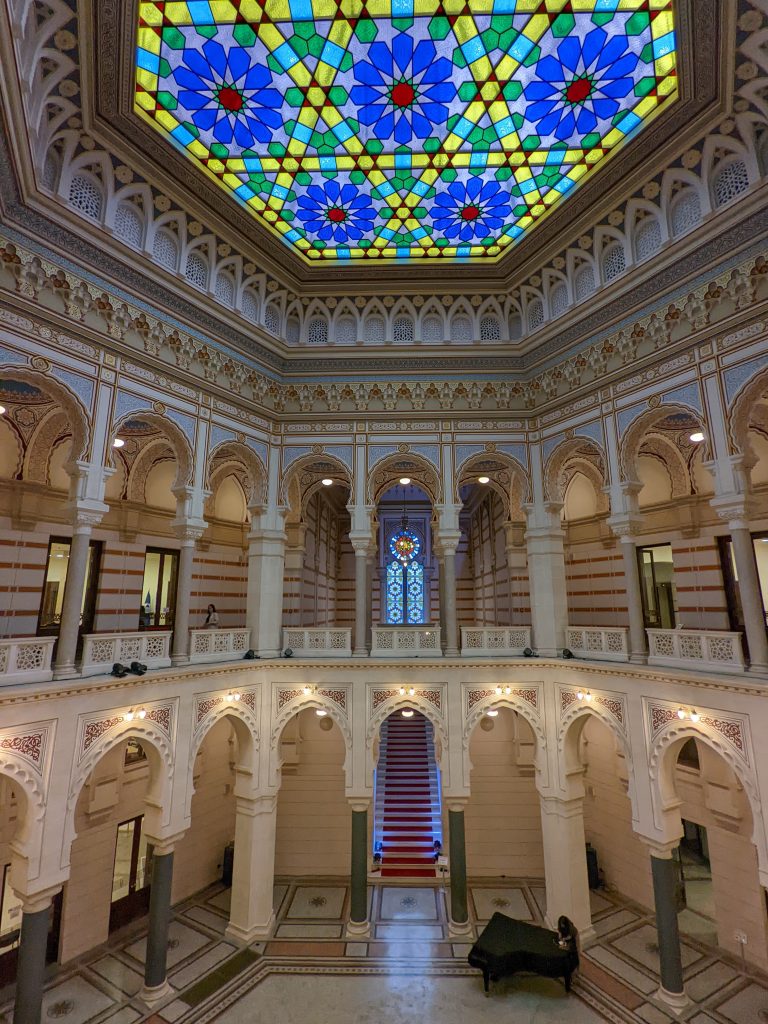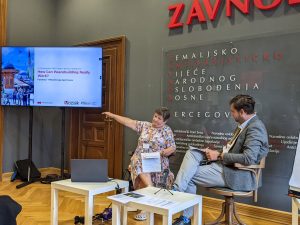Over three decades have elapsed since the break up of Yugoslavia, and the subsequent fragmentation of the Balkans amidst violence and war. Since then, many of Sarajevo’s buildings have been rebuilt. Among them is the breath-taking Sarajevo City Hall – once a library hall burned to the ground, now re-established with stained glass ceiling and Ottoman style pillars. It was here that the Konektor Philanthropy East Forum, dubbed “Peace, Justice and the Promise of Democracy – What Did We (Not) Learn?” was held.
Such symbolism couldn’t be missed here. An apt backdrop to this year’s Konektor conference on various ways on how philanthropy can aid peace building. Sarajevo constantly gives reminders that in healing, it’s not just the buildings that need repairing.
How much time needs to pass from wars to really see what’s going on? Is there a place for hope and intergenerational dialogue? These were some of the pressing questions in a lightning talk session on how the youth could be key. Facing up to those challenges were local activists on stage.
“Youth in South Eastern Europe are very contradictory. We (born and raised in Bosnia), are overwhelmingly pro-EU. We want the luxuries associated with EU member states. Balkan youth want to be in the EU because it brings stability. But at the same time, although they feel they trust EU leaders more than their national government; they don’t want to participate in politics – but want better politics. Who is going to break a deadlock of trust?” said Ema-Džejna Smolo-Zukan, regional communications coordinator at Friedrich-Ebert-Stiftung (FES).

Sarajevo City Hall. Once a library burnt to the ground. Now open to the public. Photo by Shafi Musaddique
Milan Vujic, a student and activist from Serbia, studying at the Central European University, was violently beaten by police and state authorities, he says, for “telling the truth”.
“The difference between the two generations quickly emerged, big differences. Western Balkans won’t join the EU anytime soon but young people in Serbia are figuring out… Let’s give people the chance to work on things they’re interested in. Its not necessarily democracy; they care about mental health, digitalisation, etc. If you give them the chance to work together on something that drives them, creating a model on, that is the only way,” he said.
“Young people are not understood. They want to get out of party politics logic. We need to build the skills for them to participate in a natural way,” argued Corina Pirvulescu, of the Hertie School of Governance.
The panel warned of new subcultures rising that threatened progress in the Balkans. Right wing propaganda is often delivered through local music. Tiktok campaigns on Vladimir Putin romanticise the Russian president.
“We are facing dangerous levels of polarisation in Europe,” said Pirvulescu. “That comes from how resources are distributed, not from how long someone takes on Tiktok.”
Distributing resources and supporting social entrepreneurs, “normal in Western Europe but here not so much” would give young people the power “perceive themselves as the wind of change,” she added.
How can peace building really work?
Both Bosnia and Northern Ireland experienced violent upheaval. Both tackled community healing to different degrees. In this session, the importance of peace building efforts before, during, and after conflicts was analysed by two strong voices from different generations.
The session Avila Kilmurray and Nedim Krajišnik between evoked strong emotions, with an engaged audience hanging on every word.
“This session won’t be on theory. We won’t tough words. Our wish is to offer common sense. It will never become boring,” said Krajišnik, executive director at the Center for Educational Initiatives Step by Step.

Avila Kilmurray and Nedim Krajišnik discuss the efforts of peace building in both Northern Ireland and Bosnia
Kilmurray played a critical role in Northern Ireland’s peace building during ‘the Troubles’ of the 1970s and 1980s, and still does to this day, decades after the Good Friday agreement was established in the 1990s. For her, top down peace building “never works”.
“People’s concerns are poverty, money for school uniforms and having no jobs during conflict. We had 80 percent unemployment in Northern Ireland, because who would come to a place where bombs go off all the time?” she said.
Peace has held in Northern Ireland despite almost 100 peace walls still dividing communities today. And despite the walls, local people “felt curious” about the idea of funding initiatives not just for themselves, but for the opposing community; “if you fund us, we want to rotate it to see if the other side is getting more than us,” said Kilmurray.
Kilmurray worked on getting people small amounts of funding, with an organisation bringing women together on the last Friday of every month for the last 20 years. “When you’re working on a programme like that, never to stop,” said Kilmurray, in a nod to recent foundation cuts and withdraws elsewhere in Europe.
Small actions by philanthropy could make a huge difference to peace building efforts and societal reform. Kilmurray recalled how paramilitaries “knee capped people for petty crime”. A small grant from the Jospeh Rowntree Foundation allowed local activists to work with those doing the ‘knee capping’.
“It was about talking to them; you say you’re against torture against your people, would shooting someone in the knee be torture, too? They stopped it eventually. Thats where monitoring comes in,” she said.
For Krajišnik, a Bosnian, says there is still a lack of trust in local politics, permeating itself in philanthropic efforts within the Balkans.
“Young people are lacking in new ideas; traditional ideas of peace building still hold. There is an incapability of finding new ideas. Bosnia is top down,” he said.
Krajišnik believes a “peace building industry” has bloated Bosnia, where consultants and organisations have piled in funding projects that have little impact on the ground.
Combating authoritarianism and ensuring philanthropy reaches the arts
The rest of the Konektor conference followed in similar fashion. A session on why arts were essential in the war years opened the role philanthropy must play in establishing cultural initiatives to rebuild after war.
“Culture and democracy are linked. We must understand how linked they are intertwined. How much does it count when you give money to the arts that you address social issues? We can’t counteract the influence of influencers, Netflix, etc. Lets use them to really transmit the values that we are keen to transmit. How do we make influencers understand better what democracy is about?” said Corina Șuteu, an international cultural consultant.
For her, foundations are bridging a gap “where government no longer acts” with the EU “too bureaucratic in facing the needs of art and culture.”
The panel cited the Sarajevo film Festival, started during war in 1993. For locals, it was vulnerable times. “But art – a pillar of democracy – meant so much for Bosnians. Similar things happened in Croatia and Kosovo. It gives intimacy when culture is present; it gives a safe space for people to escape for a second their reality. The arts meant a great deal to this city and region,” said Beka Vuco, president of My Balkans.
There was a period after the fall of communism where grant giving was active in Western Balkans and Central Europe. For the panellists, there was a belief that was funded in the 1990s became effective in 2000-2010.
“What do we see in 2020? Look in the Balkans, you see the values are regressing. If you stop funding cultural organisations, you stop creating biodiversity. The values of democracy are now decreasing,” added Șuteu.
Day Two of Konektor touched on similar themes; the need for civil society to act as a counterweight to political dysfunctionality. In a talk about rebuilding Ukraine with a potential Marshall Plan, the audience were asked to remember that “philanthropic engagement is critical when Ukraine fatigue sets in”.
There was a sense of concern in the withdrawal of large philanthropic players from the region at a fragile time for democratic values.
The conference ended as it began, with an emotional connection to the wider history. A site visit at the War Childhood Museum brought many of the participants to tears. The museum started off as a book, before developing into a building housing objects from children who grew up in wartime Bosnia, showcasing their ingenuity, fears and hopes. Conference dialogue stimulated the mind; this left a mark on the heart. An emotional connector, at Konektor.
Shafi Musaddique is the news editor at Alliance magazine.






Comments (0)